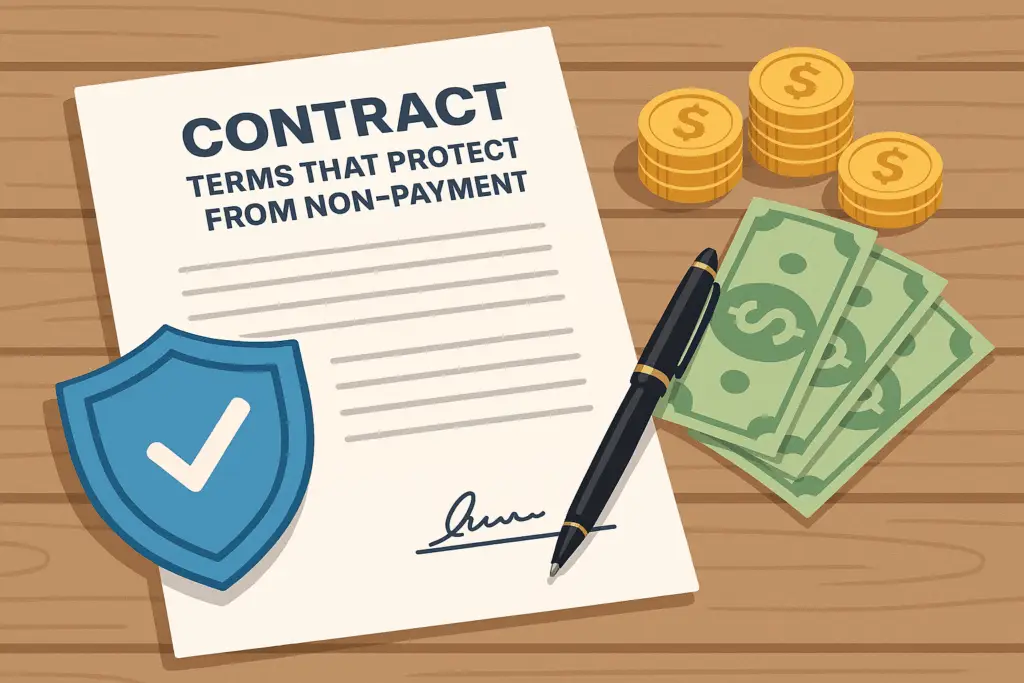Essential Clauses Every Florida Business Should Use to Get Paid
Whether you’re in construction, distribution, manufacturing, or professional services, getting paid on time is critical to your business. But too often, Florida businesses extend credit or perform work without the right contract terms in place—and are left chasing unpaid invoices with little legal leverage.
As a Florida construction and business attorney, I regularly help companies draft and enforce contracts that prevent payment issues before they start. In this article, we’ll walk through the key contract clauses that help businesses get paid faster—and more reliably.
🧾 Why Your Contract Matters in Getting Paid
A well-drafted contract:
- Defines payment expectations
- Creates leverage if payment is late
- Allows you to recover attorney’s fees and costs
- Reduces the risk of disputes and non-payment excuses
In short, your contract is more than a formality—it’s your first and best collection tool.
🛠️ Key Contract Terms to Protect Against Non-Payment
1. Clear Payment Terms (Amount + Timing)
Always include:
- Total contract price or billing rate
- Specific due dates (e.g., “net 15,” “due upon receipt”)
- Milestone or progress payments (if applicable)
- Payment method instructions
✅ Tip: Avoid vague phrases like “payment due upon completion” or “to be determined.” Precision eliminates loopholes.
2. Late Payment Interest / Finance Charges
Include a clause that allows you to charge interest on past-due balances, such as:
“Past due amounts shall accrue interest at 1.5% per month (18% per annum) until paid in full.”
This adds pressure to pay and can help you recover more if the matter goes to court.
3. Attorney’s Fees and Costs Provision
Under Florida law, you can only recover attorney’s fees in a contract dispute if your agreement says so. Include language like:
“In any dispute arising from this Agreement, the prevailing party shall be entitled to recover reasonable attorney’s fees and costs.”
This levels the playing field and encourages quick resolution.
4. Personal Guarantee (When Dealing With LLCs or Corporations)
If you’re doing business with a company—especially a new or small one—consider requiring the owner to personally guarantee payment. That way, if the business goes under or disappears, you’re not left empty-handed.
✅ This is especially helpful in industries where businesses frequently fold and rebrand.
5. Termination Rights for Non-Payment
You should have the right to stop work or cancel the contract if the client stops paying. Sample language:
“Contractor may suspend performance or terminate this Agreement if payment is not received within 10 days of written notice.”
This gives you leverage without immediately jumping to litigation.
6. Lien or Collection Rights Disclosure (Construction Industry)
If you’re in construction, your contract should reference your right to file a construction lien or pursue other remedies under Chapter 713, Florida Statutes.
This helps clients take your payment rights seriously—and can support your case later if litigation becomes necessary.
7. Choice of Law and Venue
Make sure your contract specifies that disputes will be governed by Florida law and heard in a local court near you. Otherwise, you could end up litigating in a faraway state—or dealing with unfamiliar laws.
✅ Example:
“This Agreement shall be governed by the laws of the State of Florida. Venue shall be in [Your County] County, Florida.”
👨⚖️ Why Work With a Florida Construction and Business Attorney?
Online templates won’t protect you if a customer stops paying. And vague or outdated contracts won’t help much in court.
At Douglas Law Firm, we help businesses across Florida:
- Draft custom contracts tailored to their industry and customer base
- Strengthen their terms to minimize non-payment risk
- Enforce payment rights through demand letters, litigation, and liens
Whether you’re a contractor, supplier, or service provider, we’ll help you put the right language in place—before there’s a problem.
📌 Final Takeaway
If you’ve been burned by a non-paying client before, don’t just focus on collections—focus on prevention. The right contract language gives you leverage, legal protection, and peace of mind.
📞 Douglas Law Firm represents Florida businesses in all aspects of contract drafting, enforcement, and collections. Contact us today to review your agreement—or create one that protects your business from the start.
